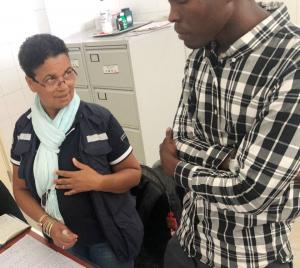Dr Eva de Carvalho, Malaria Programme, WHO
Dr Eva de Carvalho has been working on malaria in Mozambique for more than 15 years. For the emergency response, she is supporting the provincial health authorities to supervise the work of the health clinics in the accommodation centres.
"I am here to help my country with my experience and knowledge. My dream is to eliminate malaria by 2030."
What work is being done at the health clinics in the accommodation centres?
The fundamental purpose of these health clinics in the accommodation centres is to screen and treat the people who live here who need medical assistance.
Of course, the most frequent disease we are seeing is diarrhoea. As you know, Beira has a cholera outbreak, so we need to screen for diarrhoea. Malaria is also likely to be one of the most common diseases soon.
But we are also providing the complete basic package of care, from maternal and child health, to chronic diseases such as tuberculosis and diabetes, to ensure people do not stop their treatment.
The clinic also has another extremely important function. That is to promote health for the people who live here. It is very crowded here so there are measures they must take to protect against diseases. These include water chlorination, hand washing, environmental hygiene, use of mosquito nets. All of these are part of the disease prevention package.
Community engagement is crucial for all of this work. If the community is not informed and engaged, then whatever we do will not work so we must ensure their participation.
What are your impressions of the health posts?
Today I have already visited two accommodation centres. I am generally satisfied with the availability of the medicines. The health professionals here know exactly what they are doing and they are doing things correctly. It makes us at WHO very pleased to see that the health posts are doing such a good job providing health services.
What are the challenges here at health posts in accommodation centres?
One of the challenges is the lack of sufficient human resources. As we have seen, the nurse here works from 7am to 5pm without replacement. This is something we have yet to review. But in this emergency situation, one of the realities is that we have limited resources.
We now have cholera which is due to the lack of safe drinking water. With all the water around, the next problem we are going to have is an increase in mosquitoes and consequently malaria. That’s why I am making sure that health professionals know how to correctly diagnose and treat this.
Apart from this very important treatment, we need to reinforce prevention. The national malaria program is distributing mosquito nets in four priority districts in the city of Beira. Our challenge is ensuring that everyone uses the mosquito nets. Also in two weeks they will start spraying the accommodation centres.
What do you like about your job?
As the focal point of malaria, this is my passion and my concern, with malaria being one of the most frequent diseases in this area.
Our goal is to use all possible measures to prevent malaria from being another serious problem after cholera. I want to believe that we will succeed.
I am here to help my country with my experience and knowledge. My dream is to eliminate malaria by 2030.





